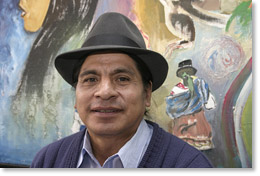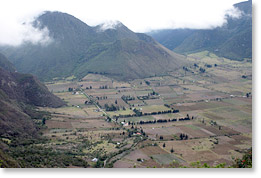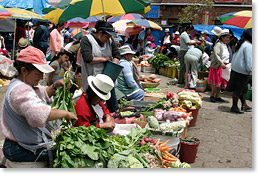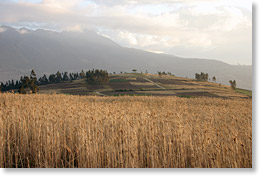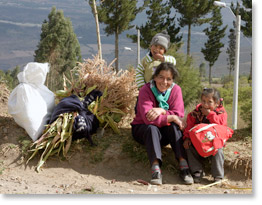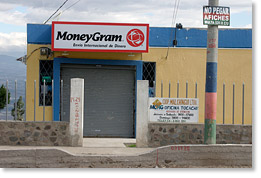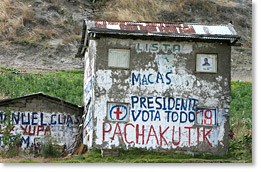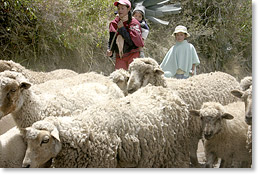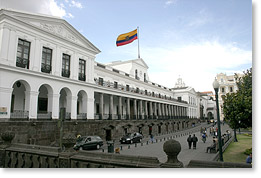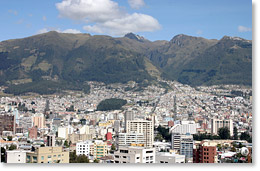|
Interview with Dr. Luis Macas of CONAIE
The Confederation of Indigenous Nationalities of Ecuador “What we are proclaiming is the self-determination of the peoples”
The significance of nationality Luis Macas: My name is Luis Macas, and I am currently president of the Confederation of Indigenous Nationalities of Ecuador (CONAIE). For example, we believe that a nationality is defined by a territory. The indigenous nationalities have territory. Many of them, obviously, do not have all of their original territory, but there is still a continuous resistance being kept up by the peoples to maintain their territory. Territory involves not only the concept of market, the concept of development and the concept of production, but also the fundamentally spiritual concept of territory in the indigenous world. We are part of nature. We are part of the land, of territory, in such a way that, in this context, if we do not have this fundamental element we are not able to speak of education, of health, of identity. Because of this, territory is a fundamental element of nationality. Another basic element is the historic process, the process of the constitution (creation) of the peoples, whose origins go back thousands of years. These are not recent developments, but they go back many years. The Quechua, we have been here for four thousand years; the Chachis; the Shuar, they are in Amazonía, in the forest area: this historic process has made us into a people, a nation. Language. Language is fundamental for a people. That is the central point in the identity of a people. Here, by language, we have thirteen nationalities in Ecuador, and, through time, with the advent of the conquest, the colonial times, obviously some nations, some nationalities, have also died out. And so anthropologically we call ourselves peoples, a part, a fraction, of a nationality. But, in any event, the linguistic roots of the thirteen nationalities here in Ecuador are completely distinct. They have roots, different linguistic trunks from distinct origins. They are not just from one people. There is, unfortunately, a lot of confusion in our country, because people do not know about, do not study, the native, the indigenous. So in that regard those elements come together. Of course they also bring us together as nationalities. The spiritual, religious part, that is why we have taken up nationality as a banner of struggle, so we can have full recognition by the state, and by society as well. In Motion Magazine: What is the situation with the land, with agrarian reform? Luis Macas: Well, obviously it has gone through various stages. First, when the conquistadors (the conquerors) arrived, these lands suffered invasions. These territories suffered destruction, unlawful seizure, by the conquistadors. And after the colonial period there was the era of the hacienda, of feudalism. That, unfortunately, lasted until the ‘60s and ’70s. In 1964 a law was established which is called the Ecuador Agrarian Reform Law. Obviously this law answered to the demand, to the struggle of the peoples, the communities, the indigenous, even. This law was also a response to pressure from outside the country, an external pressure, because at that time agrarian reform was growing in countries like Cuba. As an alternative, another form of agrarian reform began here in Ecuador, in Peru, in Bolivia, trying to anticipate just what was happening in Cuba because here, in this country, there was a lot of mobilization by the indigenous people demanding recovery of lands. So, in 1964, the first agrarian reform law was enacted. But it did not succeed in being a general agrarian reform of the large landed estates (latifundios), so there was a reform of this law in 1973 to perfect the distribution of land through agrarian reform. During these two periods of agrarian reform, the state lands were adjudicated, and many lands which had already been released were not. What the state did was adjudicate their own lands. The state had many lands that were not in the hands of the agricultural workers, so what they did during this period of agrarian reform was hand over those lands, the ones the state held. Lands belonging to the church and many large estates still have to be distributed, from individuals obviously. And, those lands are being bought and sold primarily by the haciendas (the big estates) which are dedicated to monoculture: for example, bananas and palm oil cultivation on the coast; soy crops; corn. What they have been doing is increasing their expanses of land with the result that we have many people who do not have land, and a few people who have more than enough large tracts of land. A new restructuring of the agrarian system and food sovereignty That is why the demand in this new Constitutional Assembly is for a new restructuring of the agrarian system, of landholding, in our country. We believe what is important right now is a new agrarian reform in Ecuador in order to encourage production by campesino hands, by medium and small-size producers who are the ones who feed the people. Because what the large haciendas obviously do is to produce on large stretches of land, but these are products for export -- the flower growing, for example, they are not products which ensure food for the people. The same with bananas. They are sent away to Europe, to the United States. Similarly, other products, for example the pecana africana. It is an industrial product, for the fats and oil industry. Etcetera. In any case, we are saying that there has to be a revival of the people’s basic foods. It is necessary to think about the small and medium-sized producers. For example, perhaps you have seen the pathetic case, here in the mountains, we don’t have any land because of the lack of incentives for cultivating crops. But I believe what obviously must be done is to recover the technology of the people. We do not necessarily have to have the technology that has been brought to us for many years. For example, the technology from the ‘60s and ’70s, from the 40 years of the Green Revolution, that has done so much damage with industrial production, with agricultural inputs (editors: for example, fertilizers, pesticides). Right now, we are talking about how we can recover an equal technology which maintains the traditional ways of the people and is in harmony with nature. Constitutional Assembly: a pluri-national state In Motion Magazine: The Constitutional Assembly is important? How are the people able to be involved and is it connected in some way with the communitarian vision? Luis Macas: First of all, the Constitutional Assembly is an old aspiration of the indigenous communities, the indigenous nationalities in Ecuador, that was born in 1990. This proposal is an inspiration and a dream of the indigenous people in Ecuador, and of other social movements also, because we see with absolute seriousness that this country must change. But not just a change as seen by some political parties or by some politicians, no not just political changes. I believe that is not it. It has a lot to do with the character of the state, with the makeup of the day-to-day state, no? With more participation by the communities, the indigenous, the Afro-Ecuadorians, and other sectors that have been passed over by the day-to-day state. It has been a state that is characterized by a lot of exclusion of these sectors. There hasn’t been any integration of people for almost 180 years of the republic’s life -- a vertical state, a state that legislates, a state that, in other words, hasn’t arrived for all these social sectors. We believe that the character of the state must be pluri-national, a state that recognizes each one of the existing nationalities in this country. Isn’t that is what a constitution is for? In 1998, the indigenous communities embraced this idea of collective rights, for example, territorial rights, organizational, administrative, and judicial rights. But, most seriously, what is intended here is that the state be declared a plurinational state, a state which permits the development of each of the identities which exist in this country. The peoples are above all, of historic importance. There is no comparison. The state is very young, and the indigenous nations have been in these territories for thousands of years. But they have not been a part of this state, we are not part of implementing a state, as it functions at this time. That is why we believe that the first thing for us is this, the declaration of a country that protects everyone equally. An education in indigenous languages would achieve a part of that recognition -- currently it is only an appendix of the national education system. What we propose is that the education system for the indigenous communities be equal to the regular national education system. We are proposing that their (the indigenous nationalities’) forms of organization, their spiritual forms have their own growth, development. In other words, what we are proclaiming is the self-determination of the peoples – which is, I believe, the ultimate objective of all the nationalities here in Ecuador. Everything must be democratized Obviously, in political matters (also) changes are needed. For example, when we are talking about the political center, we are talking, fundamentally, of the institutions of public finance, the Controller General’s office, the Superintendent’s office (budgetary and fiscal oversight and administration). All these entities of control are chosen by the political parties, and we are saying that they should not be chosen by the political parties. They should be chosen by the people and by the merits that people have to be able to hold a position with such a high level of responsibility. The Supreme Court has, for a little more than a year, become an "independent" body because it has always been chosen by the National Congress. And the representatives of the political parties are, obviously, in the National Congress, and the political parties that enter Congress are those parties which have the economic capacity to be able to control these public bodies. We are saying that everything must be democratized, that the people must be able to be participants in the constitution, in the way these public officials are chosen. We are saying that the justice system should be depoliticized. The system is very politicized here. The judges are representatives of political parties. There is no independence. Impartial justice does not exist in this country. That is why we see so much impunity. There are people abroad who left with public monies and nothing happens. These people should be in prison, or I don’t know where, but not enjoying the wealth of the people. We say that the other fundamental aspect is the social aspect. A reconstitution of our peoples. Right now there is incredible social breakdown in our country: a product, a consequence, obviously, of this model, this kind of politics in our country. There is a polarization of society at this time -- a few have, and many people who don’t have enough to be able to survive. That breakdown is precisely so because it has been generated by this indiscriminate form of the widening of the gap between rich and poor. The people have had to leave the countryside, they have had to move out of the country. Many people are in Europe, in the United States. There is a breakdown of the family, of the communities. So we are working for the remaking of society. But, obviously, we are thinking of the long term.
In the constitution we can realistically think about, for example, a major investment in education, in health. For healthcare to be free, for example. Education should be free. And other services in the rural communities where so much is lacking. In Motion Magazine: How do people participate in this process in the small communities? Luis Macas: Well, as I said, the Constituent Assembly process has been around since the nineties. And, obviously, the constitution, and above all these proposals that we have generated, they are not from today, they come from a long time ago -- discussions in the communities, discussions in the organizations, discussions in Amazonia, here in the Andes, on the coast. That is to say, it is participation by the peoples in the constitution -- a proposal of the indigenous movement. And we are going to make this proposal public on the 12th of October, this proposal for the Constituent Assembly. We are going to deliver it to all the candidates who won in the elections. We are going to deliver this Constituent Assembly proposal from the indigenous movement of Ecuador. But of course you know that everything in this Assembly is not guaranteed. We do not know how things are going to turn out. So, we have proposed to the president of the republic that the indigenous peoples, the indigenous nationalities, have direct representation – without our having to submit to universal elections, in Ecuador, -- the Chachi nationality, the Epera nationality, the Amazon nationalities Siona, Secoya, Cofán and others should have direct representation in the Assembly - and this has not been allowed for us because it is confused with unionism. "There are social organizations, they are indigenous." "There are corporations, they are indigenous organizations."' We are saying to the country and we have said to the president of the republic, we are not unions, neither are we corporations -- we are nations and as nations we want to participate in the Constituent Assembly in our own voice, speaking our own language. That is what we would want to do in the Constituent Assembly. I believe that it is not possible (that there be only) four of five indigenous out of three hundred representatives. So, yes this is an important time, a vital period for the country, but if we don’t concern ourselves more, there won’t be representation from the indigenous movement which is precisely what we want from this Constituent Assembly. Published in In Motion Magazine June 6, 2008 Also see:
|
||||||||||||||||||||||||||||||||||||||||
If you have any thoughts on this or would like to contribute to an ongoing discussion in the  What is New? || Affirmative Action || Art Changes || Autonomy: Chiapas - California || Community Images || Education Rights || E-mail, Opinions and Discussion || En español || Essays from Ireland || Global Eyes || Healthcare || Human Rights/Civil Rights || Piri Thomas || Photo of the Week || QA: Interviews || Region || Rural America || Search || Donate || To be notified of new articles || Survey || In Motion Magazine's Store || In Motion Magazine Staff || In Unity Book of Photos || Links Around The World NPC Productions Copyright © 1995-2018 NPC Productions as a compilation. All Rights Reserved. |


